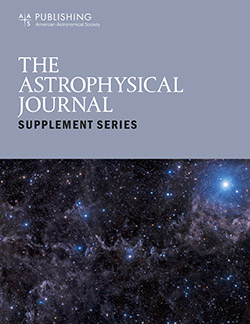Boundary Treatment for the Subsonic/Alfvénic Inner Boundary at 2.5 R ⊙ in a Time-dependent 3D Magnetohydrodynamics Solar Wind Simulation Model
IF 8.5
1区 物理与天体物理
Q1 ASTRONOMY & ASTROPHYSICS
引用次数: 0
Abstract
Abstract A new magnetohydrodynamics (MHD) simulation model of the global solar corona and solar wind is presented. The model covers the range of heliocentric distance from 2.5 solar radii, so that coronal mass ejections at the earliest phase near the Sun can be treated in the future. This model is constructed by introducing a characteristics-based boundary treatment to an existing heliosphere 3D MHD model. In tailoring a set of characteristic equations for this new model, we assume that the coronal magnetic field is open to interplanetary space and that the solar coronal plasma is flowing outward everywhere at 2.5 solar radii. The characteristic equations for the subsonic/Alfvénic inner boundary surface are satisfied by altering the plasma density and/or temperature to maintain a polytropic relationship. In this article, the details of the characteristics-based boundary treatment for the middle of the corona (named CharM) are provided. The quasi-steady states of the solar wind derived from simulations with various choices of a parameter in the boundary treatments are compared and examined. Although further improvements are needed, we apply the new boundary treatment to simulations for three Carrington rotation periods from the minimum to maximum phase of the solar activity cycle, and show that an optimal choice yields a reasonable quasi-steady state of the transonic/Alfvénic solar wind matching the specified subsonic/Alfvénic plasma speed at 2.5 R ⊙ .时变三维磁流体力学太阳风模拟模型中2.5 R⊙处亚音速/ alfv内边界的边界处理
摘要提出了一种新的全球日冕和太阳风磁流体动力学(MHD)模拟模型。该模型涵盖了从2.5太阳半径到日心距离的范围,因此可以在未来处理太阳附近最早阶段的日冕物质抛射。该模型是在现有的日球层三维MHD模型中引入基于特征的边界处理而构建的。在为这个新模型量身定制一组特征方程时,我们假设日冕磁场对行星际空间是开放的,并且太阳日冕等离子体在2.5太阳半径处到处向外流动。通过改变等离子体密度和(或)温度来保持多向关系,亚音速/阿尔夫萨奇内边界表面的特征方程得到满足。在本文中,详细介绍了基于特征的日冕中部边界处理方法(称为CharM)。对边界处理中不同参数的模拟所得的太阳风准稳态进行了比较和检验。虽然还需要进一步的改进,但我们将新的边界处理应用于太阳活动周期从最小相到最大相的三个卡灵顿旋转周期的模拟,结果表明,在2.5 R⊙下,最优选择产生了与指定亚音速/阿尔夫萨奇等离子体速度匹配的跨音速/阿尔夫萨奇太阳风的合理准稳态。
本文章由计算机程序翻译,如有差异,请以英文原文为准。
求助全文
约1分钟内获得全文
求助全文
来源期刊

Astrophysical Journal Supplement Series
地学天文-天文与天体物理
CiteScore
14.50
自引率
5.70%
发文量
264
审稿时长
2 months
期刊介绍:
The Astrophysical Journal Supplement (ApJS) serves as an open-access journal that publishes significant articles featuring extensive data or calculations in the field of astrophysics. It also facilitates Special Issues, presenting thematically related papers simultaneously in a single volume.
 求助内容:
求助内容: 应助结果提醒方式:
应助结果提醒方式:


